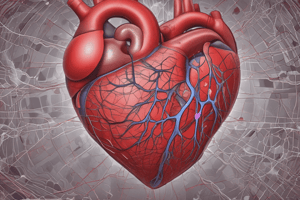Podcast
Questions and Answers
What is acute coronary syndrome?
What is acute coronary syndrome?
- A term describing symptoms caused by myocardial ischemia (correct)
- A type of heart surgery
- A heart defect present at birth
- A minor health issue
What does AMI stand for?
What does AMI stand for?
acute myocardial infarction
What is angina pectoris?
What is angina pectoris?
Transient chest discomfort caused by partial blockage of blood flow to the heart
What does the term 'anterior' refer to in anatomy?
What does the term 'anterior' refer to in anatomy?
What is the function of the aorta?
What is the function of the aorta?
What is an aortic aneurysm?
What is an aortic aneurysm?
What is the role of the aortic valve?
What is the role of the aortic valve?
Define arrhythmia.
Define arrhythmia.
What does asystole mean?
What does asystole mean?
What is atherosclerosis?
What is atherosclerosis?
What is the atrium?
What is the atrium?
What does automaticity refer to in cardiac tissues?
What does automaticity refer to in cardiac tissues?
What is the autonomic nervous system responsible for?
What is the autonomic nervous system responsible for?
Define bradycardia.
Define bradycardia.
What is cardiac arrest?
What is cardiac arrest?
What is cardiac output?
What is cardiac output?
What is cardiogenic shock?
What is cardiogenic shock?
Define congestive heart failure (CHF).
Define congestive heart failure (CHF).
What are coronary arteries?
What are coronary arteries?
What does it mean to defibrillate?
What does it mean to defibrillate?
What is dependent edema?
What is dependent edema?
What does dilation refer to in a medical context?
What does dilation refer to in a medical context?
What is a dissecting aneurysm?
What is a dissecting aneurysm?
What is a hypertensive emergency?
What is a hypertensive emergency?
Define infarction.
Define infarction.
What does 'inferior' refer to in anatomy?
What does 'inferior' refer to in anatomy?
What is ischemia?
What is ischemia?
Flashcards are hidden until you start studying
Study Notes
Cardiovascular Terms and Conditions
- Acute Coronary Syndrome: A collection of symptoms due to myocardial ischemia, including angina and myocardial infarction.
- Acute Myocardial Infarction (AMI): Also known as a heart attack; characterized by the death of heart muscle from obstructed blood flow.
- Angina Pectoris: Temporary chest pain resulting from partial blockage of blood flow to the heart.
- Atherosclerosis: A condition where cholesterol and calcium buildup leads to plaque formation, causing partial or complete blood flow blockage.
Heart Anatomy and Function
- Aorta: The primary artery that channels blood from the left ventricle to the entire body.
- Aortic Aneurysm: A condition marked by weakness in the aorta's wall, increasing the risk of rupture.
- Aortic Valve: A one-way valve between the left ventricle and aorta, preventing backflow of blood into the ventricle.
- Atrium: Upper chambers of the heart; the right atrium receives blood from the vena cava, while the left receives it from pulmonary veins.
Cardiac Conditions and Symptoms
- Arrhythmia: Irregular heartbeats deviating from the normal rhythm.
- Asystole: Complete lack of electrical cardiac activity, appearing as a flat line on an ECG.
- Bradycardia: Defined as a slow heart rate, specifically fewer than 60 beats per minute.
- Cardiac Arrest: Failure of the heart to produce effective blood flow; pulses are absent despite potential electrical activity.
Cardiac Output and Health
- Cardiac Output: The volume of blood the heart circulates in one minute, calculated by multiplying stroke volume by heart rate.
- Cardiogenic Shock: A condition wherein the heart fails to supply sufficient oxygen to tissues due to low blood flow; often a result of a large heart attack.
- Congestive Heart Failure (CHF): A disorder where the heart's pumping ability is compromised, leading to fluid backup in the lungs.
Emergency Situations
- Defibrillation: The process of delivering an electric shock to restore a normal heartbeat in a fibrillating heart.
- Hypertensive Emergency: A critical state of excessively high blood pressure, risking severe outcomes like stroke or aneurysm.
- Dependent Edema: Swelling in lower parts of the body due to fluid accumulation, commonly associated with CHF.
Additional Terms
- Dilation: The widening of hollow structures, such as coronary arteries.
- Dissecting Aneurysm: A medical emergency where the layers of an artery separate, allowing blood flow between them.
- Infarction: Tissue death caused by interrupted blood supply; often associated with heart or stroke incidents.
- Ischemia: Oxygen deprivation in tissues due to insufficient blood flow, resulting in nutrient deficiency.
Studying That Suits You
Use AI to generate personalized quizzes and flashcards to suit your learning preferences.




